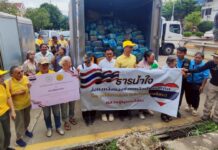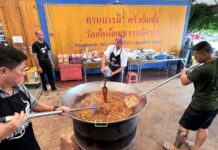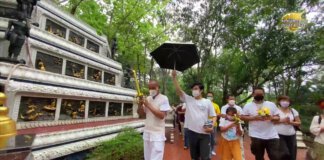มีอะไรอยู่ในพาหุง ๘ ห้อง (ตอนที่ ๓)
๓๐ สิงหาคม ๒๕๖๔
ทำไมโบราณาจารย์ท่านถึงได้ปลูกฝัง สั่งสอนให้ลูกหลานพยายามท่องจำให้คล่องปาก ขึ้นใจ
เราท่านทั้งหลายมาทำความเข้าใจในพรพาหุงทั้ง ๘ ห้องดูกันหน่อย
วันนี้ขอนำเสนอในห้องที่สาม ความว่า
นาฬาคิริง คะชะวะรัง อะติมัตตะภูตัง
ทาวัคคิจักกะมะสะนีวะ สุทารุณันตัง
เมตตัมพุเสกะ วิธินา ชิตะวา มุนินโท
ตันเตชะสา ภะวะตุ เต ชะยะมังคะลานิ
สมเด็จพระจอมมุนีทรงผจญกับพญาช้างชื่อ นาฬาคีรี ซึ่งกำลังตกมัน ดุร้ายประดุจไฟป่าที่เผาผลาญทุกอย่างที่ขวางหน้า ร้ายแรงดั่งจักราวุธ และสายฟ้า (ขององค์อินทร์) ทรงพิชิตพญาช้างด้วยวิธีรดลงด้วยน้ำ คือธรรมได้แก่ พระเมตตา ด้วยเดชแห่งองค์พระผู้พิชิตมารช้างนั้นจึงยอมศิโรราบ เข้าถึงพระรัตนตรัยเป็นสรณะ ขอชัยมงคลทั้งหลายจงมีแก่ท่านทุกเมื่อ
พรรษาที่ ๓๗ ครั้งนั้นพระเทวทัตภิกขุ แม้ได้มาบวชเป็นพระภิกษุในพุทธศาสนาแล้ว แต่ก็ยังไม่ได้บรรลุมรรคผลใดๆ เป็นเพียงผู้ทรงสมาบัติ จิตใจจึงยังลุ่มหลงในกิเลสอยู่ มีความคิดอยากได้ลาภสักการะ อยากได้บริวารมากที่มาบูชาตนเอง อยากจะเป็นผู้ปกครองคณะสงฆ์เสียเอง แต่พระพุทธเจ้าไม่ทรงอนุญาต พระเทวทัตจึงคิดการใหญ่ ใช้อภิญญาแสดงอิทธิฤทธิ์หลอกลวงให้เจ้าชายอชาตศัตรูศรัทธา และยุยงให้เจ้าชายอชาตศัตรูปลงพระชนม์พระเจ้าพิมพิสารราชบิดา พร้อมทั้งขึ้นเป็นกษัตริย์สืบแทน
ส่วนพระเทวทัต หาวิธีจะปลงพระชนม์พระพุทธเจ้า และตั้งตนเป็นพระพุทธเจ้าแทน
ครั้งแรกพระเทวทัตได้ส่งนายขมังธนู ๑๖ คน ให้ไปลอบปลงพระชนม์ แต่นายขมังธนูทั้ง ๑๖ คน เมื่อได้ฟังธรรมจากพระพุทธเจ้าก็เลื่อมใส ยึดถือพระองค์เป็นสรณะ
เมื่อแผนการนี้ไม่สำเร็จพระเทวทัตจึงคิดปลงพระชนม์พระพุทธเจ้าด้วยตนเอง โดยการขึ้นไปแอบซุ่มอยู่บนยอกเขาคิชฌกูฏ แล้วกลิ้งหินลงมาให้ทับพระพุทธเจ้า แต่ก็ไม่สำเร็จ มีเพียงสะเก็ดหินก้อนหนึ่งกระเด็นไปกระทบข้อพระบาทจนห้อพระโลหิต พระพุทธเจ้าทรงทราบว่าพระเทวทัตเป็นผู้กระทำ จึงตรัสบอกภิกษุทั้งหลายว่า บัดนี้พระเทวทัตได้กระทำอนันตริยกรรมแก่พระองค์เสียแล้ว
ครั้งที่สาม พระเทวทัตคิดร้ายต่อพระพุทธองค์โดยใช้ช้างนาฬาคีรี ซึ่งเป็นช้างที่ดุร้าย พระเทวทัตจึงติดสินบนให้ตวาญช้างมอมเหล้าช้างนาฬาคีรีด้วยเหล้าอย่างแรง ๑๖ หม้อ และใช้หอกทิ่มแทงช้างให้เจ็บ ล่อช้างที่กำลังดุร้ายเมามันนั้น ให้ออกมาทำร้ายพระพุทธเจ้า เวลาที่พระพุทธเจ้าเสด็จออกบิณฑบาตร
พอวันรุ่งขึ้น เมื่อพระพุทธเจ้าเสด็จออกพร้อมภิกษุสาวก เข้ามาบิณฑบาตรในกรุงราชคฤห์ ทิ้งระยะห่างหน่อย ควาญช้างก็ปล่อยช้างออกมาสู่ตรอกที่พระพุทธเจ้าเสด็จพุทธดำเนินออกมา
ช้างนาฬาคีรีเห็นพระพุทธเจ้าดำเนินมาแต่ไกล ก็ชูงวง หูกาง หางชี้ ทำลายบ้านเรือนและเกวียนที่ขวางทางและวิ่งรี่ตรงไปหาพระพุทธเจ้าทันที
ภิกษุทั้งหลายเห็นดังนั้น รีบกราบทูลพระพุทธองค์ว่า “พระพุทธเจ้าข้า นี่คือช้างนาฬาคีรีที่ดุร้าย หยาบช้า ฆ่ามนุษย์ได้อย่างง่ายดาย มันกำลังวิ่งตรงมาทางนี้แล้ว ขอให้พระผู้มีพระภาคโปรดเสด็จกลับเถิด ขอให้พระสุคตจงเสด็จกลับเถิด พระพุทธเจ้าข้า”
แต่พระพุทธองค์ยังคงสงบเย็นรับสั่งว่า “มาเถิดภิกษุทั้งหลาย เธออย่ากลัวเลย ข้อที่ใครจะมาปลงชีวิตของเราตถาคตนั้น นั่นไม่ใช่ฐานะ ไม่ใช่โอกาส เพราะพระตถาคตทั้งหลาย ย่อมไม่ปรินิพพาน ด้วยความพยายามฆ่าของผู้อื่น”
แต่ภิกษุทั้งหลายก็เกรงว่าพระพุทธองค์จะได้รับอันตราย
พระผู้มีพระภาคเจ้าจึงต้องตรัสย้ำคำเดิมอีกแม้เป็นครั้งที่ ๒ แม้ครั้งที่ ๓ จนช้างนาฬาคีรีวิ่งเข้ามาใกล้ ประชาชนชาวบ้านทั้งหลายแถวนั้นต่างหลบหนีขึ้นไปอยู่บนปราสาทบ้าง บนเรือนบ้าง บนหลังคาบ้าง ส่งเสียงตะโกนกันลั่นสนั่นเมือง ทั้งพวกที่ไม่ศรัทธา และพวกที่ศรัทธาก็ตาม
“พวกเราทั้งหลายเอ๋ย พระสมณโคดมกำลังจะถูกช้างเหยียบตายแน่แล้ว”
“พวกเราผู้เจริญ คอยดูให้ดีเถิดพระพุทธองค์จะทำสงครามกับช้างดุร้ายเชือกนี้”
ขณะนั้นมีหญิงแม่ลูกอ่อนคนหนึ่ง เห็นช้างนาฬาคีรีวิ่งเข้ามาก็ตกใจกลัว วางลูกไว้แล้ววิ่งหนีไป
ช้างไล่หญิงคนนั้นไม่ทัน ก็เดินวนเวียนอยู่ใกล้ๆทารกที่ร้องเสียงดังด้วยความตกใจกลัว
พระพุทธองค์ยืนทอดพระเนตรอยู่ จึงตรัสเรียกช้างนาฬาคีรีให้มาหาพระองค์ด้วยพระสุรเสียงอันไพเราะว่า
“แน่ะเจ้าช้างนาฬาคีรี เขาให้เจ้าดื่มเหล้าถึง ๑๖ หม้อ มอมเมาเสียจนมึนมัว ใช่ว่าเขาจะกระทำเจ้าด้วยประสงค์จักให้เจ้าจับคนอื่นก็หาไม่ แต่เขากระทำด้วยประสงค์จะให้จับเรา เจ้าอย่าเที่ยวอาละวาดให้เมื่อยขาโดยใช่เหตุเลย จงมานี่เถิด”
ช้างนาฬาคีรีได้ฟังแล้วก็วิ่งเข้าตรงมาหาพระพุทธองค์
ฝ่ายพระสาวกผู้มีฤทธิ์ทั้งหลาย ต่างก็รับอาสาที่จะปราบช้างนาฬาคีรี แต่พระพุทธเจ้าทรงตรัสว่า การปราบช้างนาฬาคีรีไม่ใช่วิสัยของพระสาวก เป็นวิสัยของพระพุทธเจ้าพระองค์เดียว
ขณะนั้นเองพระอานนท์ผู้จงรักภักดีในพระพุทธเจ้าเป็นที่สุด ก็ได้ก้าวออกไปยืนเบื้องหน้าพระพักตร์ของพระผู้มีพระภาคเจ้า คิดว่าเราจะสละชีวิตแทนพระคุณของพระพุทธองค์ด้วยการตายแทนพระองค์
พระพุทธเจ้าทรงตรัสห้ามว่า อานนท์จงหลีกไป ถึง ๓ ครั้ง
แต่พระอานนท์ก็ได้หาหลีกไปไม่คงยืนขวางหน้าอยู่อย่างนั้น
ขณะนั้นเอง พระผู้มีพระภาคเจ้าก็ทรงมีพระอาการสงบนิ่ง ทรงแผ่เมตตาจิตไปสู่ช้างนาฬาคีรีนั้น
ด้วยฤทธานุภาพแห่งความเมตตาและพุทธจริยาที่นุ่มนวลของพระพุทธองค์
จิตที่ขุ่นแค้นของช้างนาฬาคีรีก็สงบลง หยุดยืนนิ่ง หายมึนเมา ลดงวง และน้อมศีรษะเข้าไปหาพุทธองค์อย่างช้าๆ
เมื่อทรงเห็นอาการเช่นนั้นแล้ว พระผู้มีพระภาคจึงทรงยกพระหัตถ์ลูบกระพองช้างด้วยพระเมตตา พลางตรัสกับช้างนาฬาคีรีว่า
“ดูก่อนนาฬาคีรี เจ้าจงจำไว้ จงอย่าเข้าหาเราตถาคตด้วยจิตมุ่งทำลาย เพราะจิตชั่วเป็นเหตุแห่งทุกข์ ผู้ใดทำร้ายตถาคต เมื่อจากชาตินี้ไปสู่ชาติหน้า จะไม่มีสุคติเลย เจ้าอย่าดุร้ายมัวเมา อย่าประมาท เพราะผู้ประมาทแล้วย่อมจะไปสู่ทุคติ เจ้าจงกระทำหนทางเพื่อไปสู่สุคติเถิด”
“ดูก่อนนาฬาคีรี แม้เจ้าเป็นเดรัจฉานได้มีโอกาสพบเราตถาคตในครั้งนี้ นับเป็นกุศลยิ่งนัก ตถาคตนี้อุปมาดังพระยาช้างตัวประเสริฐ ประกอบด้วยคุณของพระอรหันต์ เป็นมิ่งมงกุฏใน ๓โลก ตั้งแต่บัดนี้เป็นต้นไป เจ้าอย่าดุร้าย ไล่ทิ่มแทงมนุษย์อีกเลย จงมีเมตตายังใจให้เกิดโสมนัส อย่าได้ประกอบโทษ จงหมั่นเจริญเมตตาให้ยิ่งๆ ขึ้น เจ้าสิ้นชีพแล้วจะได้ไปเกิดบนสวรรค์อย่างเที่ยงแท้”
ด้วยพระเมตตาอานุภาพของพระพุทธองค์ ช้างนาฬาคีรีได้ฟังธรรมเช่นนั้น ก็มีจิตชื่นชม โสมนัสยิ่งนัก ส่งเสียงร้องขึ้นรับคำ แล้วเอางวงลูบละอองธุลีพระบาทของพระองค์ นำมาพ่นลงบนกระหม่อมของตนเอง พร้อมก้าวเท้าถอยหลังออกมาชั่วระยะที่แลเห็นพระผู้มีพระภาคเจ้า จากนั้นจึงค่อยหันกลับมุ่งสู่โรงช้างที่อยู่อาศัยของตน
เทวดาและพรหมได้เห็นพุทธบารมีปรากฎเช่นนี้ จึงได้โปรยดอกไม้และของหอมบูชาพระพุทธองค์ พร้อมสิ่งมงคลอันมีค่าเงินทองก็อุบัติขึ้นในพระนครสูงถึงหัวเข่า ช้างนาฬาคีรีจึงมีชื่อใหม่ว่า ช้างธนปาล ตั้งแต่นั้นเป็นต้นมา
และหากจะมองในด้านธรรมาธิษฐาน ก็อธิบายได้ว่า พระเมตตาบารมีถือเป็นคุณสมบัติ คุณธรรม ๑ ในสิบที่ทำให้พระมหาโพธิสัตว์ได้ทรงตรัสรู้อนุตตรสัมมาสัมโพธิญาณ และเมื่อพระพุทธองค์ต้องการจะใช้พระเมตตาคุณโปรดสรรพสัตว์ย่อมมีผลมาก มีผลานิสงส์มาก นั้นก็เพราะพระองค์ทรงใช้เวลาถึงสี่อสงไขยแสนมหากัป ในการสั่งสมทศบารมีทั้ง ๑๐ ประการ
เราท่านทั้งหลายล่ะ มีชีวิตอยู่ถึงวันนี้ ได้สั่งสมบารมีอะไรไว้บ้าง
พุทธะอิสระ
————————————————-
มีอะไรอยู่ในพาหุง ๘ ห้อง (ตอนที่ ๑)
มีอะไรอยู่ในพาหุง ๘ ห้อง (ตอนที่ ๒)
————————————————-
What is in the Bahum Prayer (Jayamangala Gatha – the eight victories and blessing)? (Part 3)
August 30, 2021
Why teachers of ancient times cultivated and taught children to memorize the Bahum Prayer (Jayamangala Gatha)?
We should try to understand the meaning of the Batum Prayer with its eight parts.
Today, I would like to present you the third part of this prayer.
Nālāgiring gaja varang ati matta bhūtang
Dāvaggi cakka masanīva sudāru nantang
Mettambu seka vidhinā jitavā Munindo
Tang tejasā bhavatu me jaya mangalāni
The Buddha encountered the elephant named ‘Nalagiri’, maddened, very cruel like a forest fire, a wheeled-weapon, and a thunderbolt (of Indra). The Buddha conquered the elephant by virtues of his good will and loving kindness. Consequently, that elephant could attain and adhere to the Triple Gems (The Buddha, the Dhamma, and the Sangha). By the power of glorious triumph, may the victory blessings always be yours.
During the 37th year of Devadatta’s monkhood, he did not attain any enlightenment, but in course of time he, too, developed some supernatural powers. His mind was obsessed with defilements and greed for fortune and followers. He had an ambition to govern the Sangha (Buddhist clergy). Devadatta asked the Buddha to retire and let him take over the running of the Sangha, but the Buddha disagreed. Disgruntled, he plotted a scheme and used his supernatural powers to win Prince Ajatasattu’s faith. Devadatta instigated the Prince Ajatasattu to kill King Bimbisara, his own father, and usurp the throne.
Devadatta attempted to kill the Buddha, so that he could lead the Sangha.
In the first attempt, Devadatta sent sixteen most skilled archers to assassinate the Buddha. But when they approached the Buddha, they were unable to carry out their orders, and were converted instead.
When this scheme failed, Devadatta tried to kill the Buddha himself by climbing to the peak of the Gridhrakuta Hill and hurled a huge stone at the Buddha. On its way down, the rock struck another rock, and a splinter flew and wounded the Buddha’s foot, causing blood to flow. The Buddha knew that Devadatta did it. So, he told the Sangha with pity, Devadatta had committed unwholesome deeds for harming the Buddha.
For his third attempt to kill the Buddha, Devadatta paid the mahout to give sixteen pots of alcohol to the ferocious elephant Nalagiri and stab it with spear.
The ferocious Nalagiri was lured to hurt the Buddha, while the Buddha was walking to receive food offering.
When Nalagiri saw the Buddha coming at a distance, it raised its ears, tail and trunk and charged at him. It destroyed houses and carts on its way and dashed to the Buddha.
After seeing that, the monks informed the Buddha, “Dear Lord, this is ferocious elephant that easily kills men. It is heading here. Please go back, sir.”
However, the Buddha said calmly to them, “Monks, do not be afraid. One who has attained Buddhahood will not be killed by external violence.”
The monks were still afraid that the Buddha would be in danger. So, the Buddha had to repeat his words for the second and third times. As Nalagiri came close, both faithful and unfaithful people took refuge on the roof-tops and made loud noises.
“Oh dear, the Buddha would surely be killed by the elephant.”
“We shall watch how the Buddha would fight against with this ferocious elephant.”
Meanwhile, a frightened mother with a suckling baby dropped her baby between the Buddha and the elephant. Nalagiri chased that woman first. However, as it could not catch her, it turned towards the baby.
The Buddha was watching. So, he said to the animal gently: “Nalagiri, you have been given sixteen pots of alcoholic drink to kill me, not to kill others. So, come to me”.
Nalagiri heard the Buddha and ran into him.
The great disciples asked the permission from the Buddha to drive away the elephant. But the Buddha did not permit them to do so. The Buddha told them that only the Buddha could conquer Nalagiri.
Then, Venerable Ananda, who loved and respected the Buddha so much, went and stood in front of the Buddha at the risk of his own life. The Buddha asked him to move away three times. Venerable Ananda still stood before the Buddha.
At that moment, the buddha remained calm and radiated his loving-kindness towards the elephant. So vast and deep was the Buddha’s love that as the elephant reached the Buddha, it calmed down, stopped, became sober, put its trunk down and slowly advanced its head towards the Buddha.
Then, the Buddha stroked Nalagiri on the trunk and spoke softly.
“Nalagiri, you must never come to clash with me, the Buddha. If you try to fight with the Buddha, you may have to suffer for a long time. Nalagiri, please do not be ferocious, ignorant, and careless, because the careless will be born to states of miseries. Please build your road towards heaven.”
“Nalagiri, although you are an animal, you are blessed to meet me this time. I am like the King of Elephants which has all virtues of arhat. From now on, please neither be cruel nor harm people. Be kind and do not commit any wrong deed. Practice mercy and you will be surely born in heaven.”
Nalagiri felt the power of the Buddha’s loving-kindness in its heart. After hearing the Buddha’s teaching, it was overwhelmed with joy. Then, it cried out to acknowledge his teaching. Respectfully, the elephant removed the dust at the Buddha’s feet with its trunk and scattered the dust over its own head. Then it retreated, with its head facing the Buddha, as far as the stable, and remained fully tamed. Then, it went backward slowly and returned to its stable.
Onlookers shouted joyfully in praise of the Buddha’s marvelous performance. They threw their ornament and jewels at Nalagiri. The elephant was almost covered with the ornaments and jewels. Since that time Nalagiri came to be known as Dhanapala.
Looking at the virtue, the Buddha’s loving kindness is one among ten virtues that enabled the Buddhahood. The Buddha had spent numerous, countless lives to accumulate the ten virtues.
What about all of us? Till today, which virtues have you accumulated?
Buddha Isara
————————————————-
What is in the Bahum Prayer (Jayamangala Gāthā – the eight victories and blessing)? (Part 1)
What is in the Bahum Prayer (Jayamangala Gāthā – the eight victories and blessing)? (Part 2)







